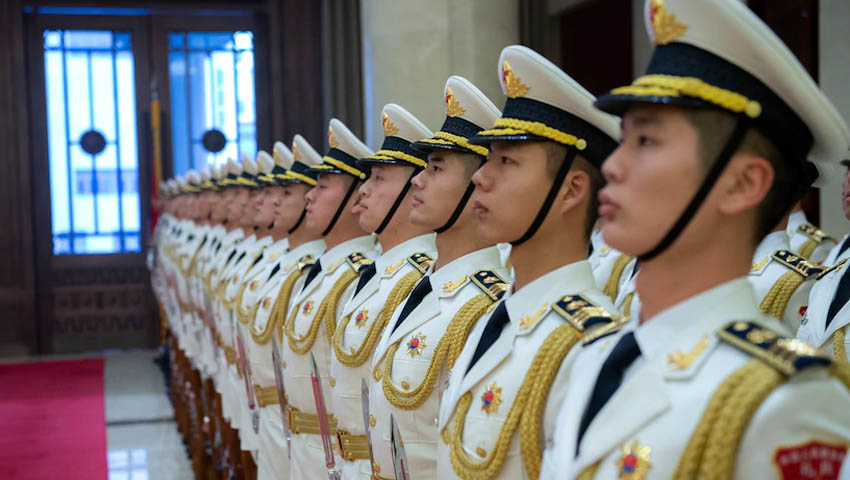Australia and its allies may be serving China’s interests by beating the war drum, according to a Lowy Institute analyst.
War-like rhetoric has invaded foreign policy discourse in recent months, with escalating diplomatic tensions between China and the West (particularly Australia) prompting fears of a looming conflict.
Most recently, China’s National Reform and Development Commission announced an “indefinite” suspension of communication with the Australian government under the China-Australia Strategic Economic Dialogue.
Beijing accused Canberra of disrupting the “normal exchanges” and co-operation between the nations “out of cold war mindset and ideological discrimination”.
This came amid Australia’s continued condemnation of CCP aggression, including its covert attempts to advance its geopolitical interests by flexing its economic muscle, its invasion of Taiwanese airspace, its oppression of Uyghur Muslims, and its questionable handling of the COVID-19 crisis.
But according to Natasha Kassam, director of the public opinion and foreign policy program at the Lowy Institute, and Mark Harrison, senior lecturer in Chinese studies at the University of Tasmania, the adoption of a war-like tone among Australia and its allies may be playing into the CCP’s hands.
Kassam and Harrison claim that this change in rhetoric has not coincided with a fundamental shift in Beijing’s strategic objectives.
“It is true the risks of conflict are increasing. Beijing has stepped up military activity in the Taiwan Strait over the past 12 months. But its long-standing fundamental policy approach to Taiwan was reaffirmed at last month’s National People’s Congress,” the analysts write.
“The messages from Beijing are deliberately mixed, but hysteria – couched in terms of preparing Australians for coming challenges – actually works in Beijing’s favour.
“It allows the threat of war itself to be used as political tactic. Creating conditions of fear around large-scale conflict divides the international community, isolates Taiwan and creates conditions for striking a grand bargain on Beijing’s terms.”
Kassam and Harrison also point to the lack of attention paid to the desires of the Taiwanese public.
“[The] voice of the Taiwanese people themselves has barely been mentioned in this conversation. It is their future and their aspirations that are at the centre of regional peace and prosperity,” they continue.
“The panic distracts from developing the responses needed to bolster the position of Taiwan and its people.”
The analysts observe that Beijing’s acts of military aggression against Taiwan are an attempt to “normalise a military presence in the Taiwan Strait” and “constrain political opinion” in Taiwan and abroad.
“It is possible, even likely, that Beijing will take an incremental step beyond the threats to date. Beijing could very well initiate a calculated limited military engagement in the Taiwan Strait or take action towards one of the Taiwan-controlled islands in the South China Sea,” Kassam and Harrison add.
“This will require a calibrated and multilateral response from countries in the region, coherent government messaging in Australia and sober analysis from the media.”
They write that if Beijing’s actions do take Australia and its allies to the “precipice of catastrophe”, presenting a “calibrated” response would be difficult, and hence, encouraging this assumption would be a “tactical goal for Beijing”.
“Catastrophism intimidates the Taiwanese people and countries in the region, exacerbates domestic political division, deters growing US-Taiwan and multilateral regional co-operation, and convinces the region that it faces a stark choice between disaster and what Beijing calls ‘reunification’,” the analysts add.
“Panic also makes it harder for the Taiwanese government to maintain a steady policy position as the overheated media reporting in places like Australia seeps into Taiwan’s domestic politics.
“Taipei needs confidence from abroad rather than constant reminders of their vulnerabilities so that it can lead effectively.”
In dealing with Taiwan, Kassam and Harrison propose that Canberra adopt “clearer steps” within its diplomatic framework with Taipei, to enshrine its support for the nation’s sovereignty.
“Ministerial visits are possible within Australia’s One China policy and the last one was 25 years ago,” The analysts write.
“Finding new mechanisms for official exchanges and support for Taiwan’s participation in the international community also strengthens Taiwan’s own policy settings and its management of its relationship with Beijing.
“Closer economic and defence co-operation could be on the table. There is also scope for non-traditional diplomacy.”
Kassam and Harrison also call on the federal government to develop a “sharper understanding” of the Biden administration’s approach towards Taiwan.
“Washington is working to tighten US alliances in the region to communicate to Beijing that it does not face an isolated Taiwan and an isolationist America,” the analysts observe.
“Rather, Beijing faces a group of countries in the region acting together to maintain the status quo in the Taiwan Strait.”
Kassam and Harrison conclude: “A thorough knowledge of the complex history and political aspirations of the people of Taiwan should anchor Australian public debate and policy-making, encouraging measured responses to Beijing’s actions.
“The extreme headlines over recent weeks highlight how far Australia’s public debate needs to go before it can meet that challenge.”
Get involved with the discussion and let us know your thoughts on Australia's future role and position in the Indo-Pacific region and what you would like to see from Australia's political leaders in terms of partisan and bipartisan agenda setting in the comments section below, or get in touch with








